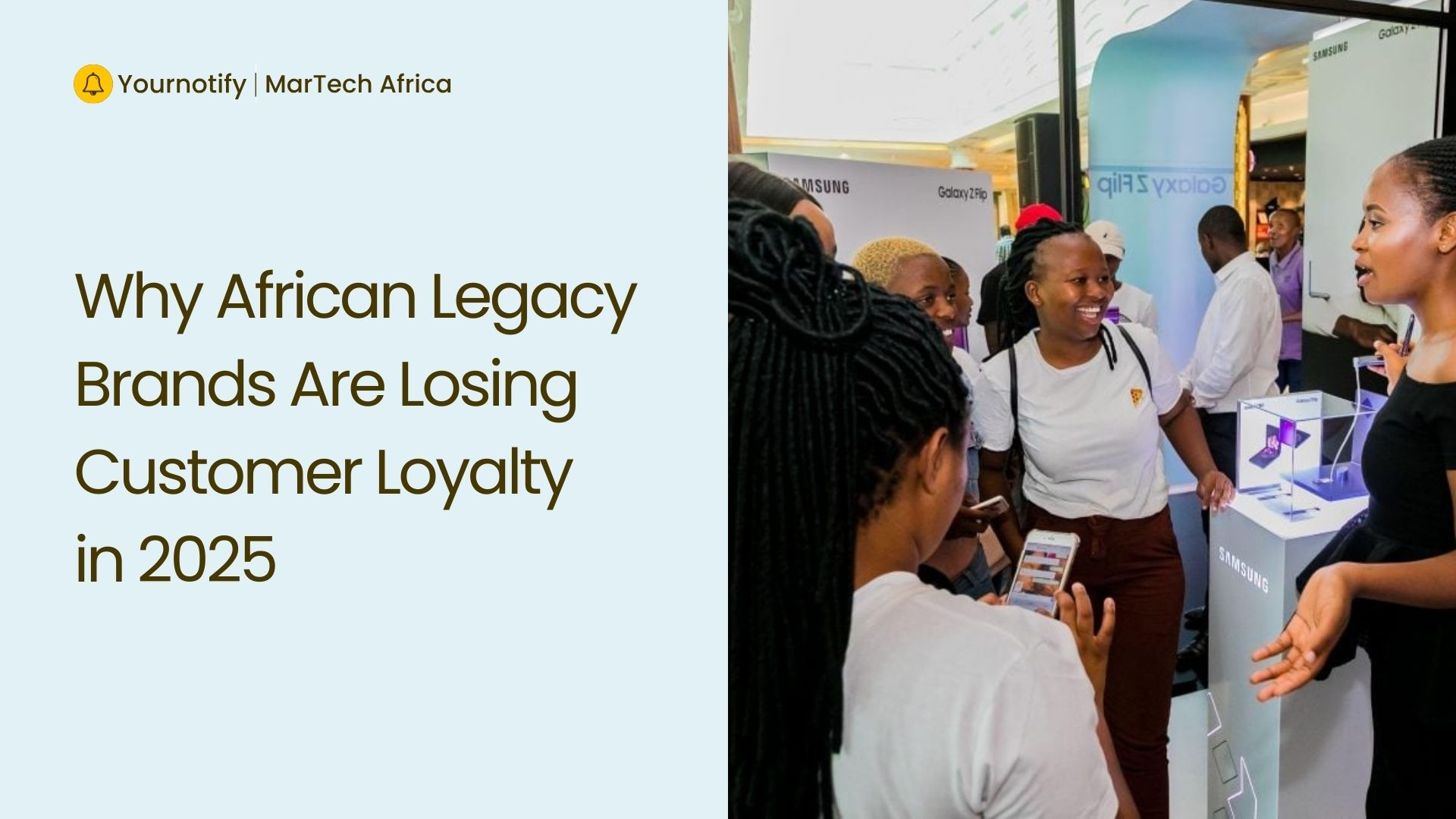In today’s competitive business environment, acquiring new customers is becoming increasingly expensive. For African businesses,…

Why African Legacy Brands Are Losing Customer Loyalty in 2025
In Africa’s rapidly evolving marketplace, legacy brands once stood as cultural icons, commanding deep trust, loyalty, and widespread relevance. From Nigeria’s fast-food giant Mr Biggs to long-standing retail chains, banks, and telecom providers across the continent, these names dominated consumer choice for decades. They were more than businesses; they were markers of identity, prosperity, and stability.
Yet today, many of these once-unshakable brands are struggling to hold their ground. Consumer behavior is shifting at unprecedented speed, shaped by a younger, more digitally savvy generation, increased competition, and rapidly changing market conditions. New entrants, nimble startups, regional challengers, and global players are seizing opportunities that legacy brands have been slow to adapt to.
This begs the question: why are African legacy brands losing customer loyalty? And perhaps more importantly, what lessons can marketers and business leaders learn from this shift to not only survive but thrive in the new consumer era?
Here are some of the reasons why brands are loosing customer loyalty in 2025
1. Changing Consumer Expectations
Today’s consumers, especially millennials and Gen Z are driven by experience, convenience, and personalization. Loyalty is about which brand offers the best value in the moment.
For example, Nigerian consumers who once flocked to Mr Biggs now prefer Chicken Republic or Domino’s Pizza because these competitors offer fresher menus, modern outlets, and better digital ordering systems. Legacy brands often fail to keep up with rising expectations, leading to a slow erosion of loyalty.
2. The Digital Disruption
Digital transformation has reshaped how Africans discover, engage with, and buy from brands. With mobile penetration in sub-Saharan Africa projected to reach 615 million users by 2025 (around 50% of the region’s population), mobile touchpoints like apps, social media, and e-commerce are now non-negotiable.
Unfortunately, many legacy brands were slow to embrace digital. By the time they built apps or optimized online experiences, younger brands had already won over consumers with seamless mobile-first solutions.
3. Global vs. Local Competition
African legacy brands also face dual competition from global entrants bringing world-class branding and local startups offering cultural relevance.
- Global fast-food brands like KFC have scaled aggressively with standardized menus, efficient service, and recognizable branding.
- Local competitors, meanwhile, adapt more quickly to consumer tastes and cultural nuances — something many older brands struggle with.
The result is a squeeze: legacy brands lose relevance in both directions, unable to match global standards or local agility.
4. The Shift in Consumer Loyalty Behavior
Consumer loyalty itself has transformed. According to PwC’s Future of Customer / Global Consumer Insights surveys, many consumers now say they switch brands more often than before the pandemic, driven by price sensitivity, product variety, and the convenience of digital options.
Legacy brands, historically relying on reputation and tradition, are now exposed: their past strengths are no guarantee of future loyalty.
5. Outdated Brand Positioning
Another key factor is the perception that legacy brands are “stuck in the past.” Outdated logos, uninspiring campaigns, and traditional marketing methods fail to resonate with modern audiences.
Contrast this with startups that position themselves around community, storytelling, and innovation. For instance, new African fashion brands leverage Instagram and TikTok to tell cultural stories, while older fashion houses often rely on traditional.
Case Study: Mr Biggs in Nigeria
Once the pride of Nigeria’s fast-food industry, Mr Biggs dominated in the 1990s and early 2000s. It was more than a restaurant; it was a cultural experience. Yet by the 2010s, the brand’s outlets dwindled.
Why?
- Outdated outlets and inconsistent quality.
- Poor digital adoption compared to new entrants.
- A failure to adapt menus and experiences to changing consumer lifestyles.
This story mirrors the struggles of many African legacy brands: slow to adapt, and quick to lose once-loyal customers.
Related Content: What Happened to Mr. Biggs and Lessons to be Learnt
What Legacy Brands Can Do to Bounce Back
The decline of legacy brands in Africa isn’t set in stone. While many have struggled to keep up, there are practical ways for them to reinvent themselves, reconnect with consumers, and reclaim lost ground. Here’s how:
1. Embrace Digital Transformation
Today’s consumers live on their phones, and any brand that fails to meet them there risks irrelevance. Legacy brands must go beyond traditional service delivery and invest in mobile apps, e-commerce platforms, and digital tools that make customer journeys seamless. if ordering food, renewing a subscription, or accessing financial services, frictionless digital experiences are no longer a luxury, they are the baseline.
2. Reimagine Brand Identity
A strong legacy does not mean being stuck in the past. Brands can signal relevance to younger audiences by refreshing their logos, redesigning physical spaces, and leaning into modern marketing channels like social media, influencer collaborations, and experiential campaigns. These steps reinterpret it for a new generation. Think of it as breathing new life into a familiar story.
3. Prioritize Customer Experience
Product alone no longer guarantees loyalty. What keeps customers coming back is how they feel when they interact with a brand. Faster service, personalized offers, and loyalty programs that truly reward customers can make a huge difference. Every touchpoint should be designed to make people feel valued and understood.
4. Stay Agile with Consumer Trends
Consumer preferences shift rapidly, and brands that cling to rigid models are left behind. Legacy players need systems to listen, adapt, and experiment quickly. This means monitoring trends, testing new campaigns, and creating feedback loops that turn customer insights into action.
5. Invest in Community & Culture
Perhaps the greatest strength African brands can tap into is cultural connection. Today’s consumers don’t just buy products; they buy into stories, pride, and shared identity. Legacy brands can reignite loyalty by embedding culture into their messaging, celebrating local heritage, and engaging meaningfully with communities. Sponsorships, storytelling, and campaigns that reflect social realities can transform them from just businesses into movements people want to belong to.
Conclusion
The decline of African legacy brands isn’t just about poor management or rising competition but failing to keep pace with the evolving customer. Today’s loyalty is fragile, shaped by convenience, technology, and cultural relevance. For legacy brands, the choice is clear: adapt, innovate, and reconnect with consumers or risk becoming a nostalgic memory.


